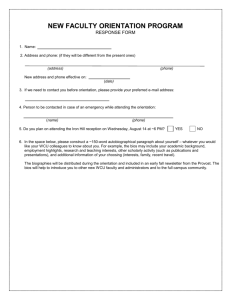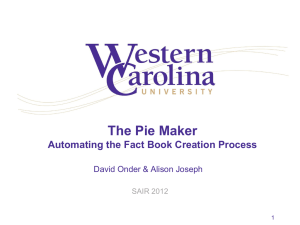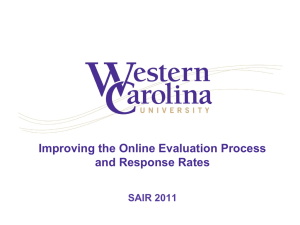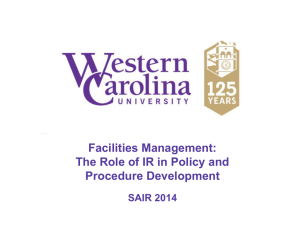Academic Program Director Guidelines
advertisement
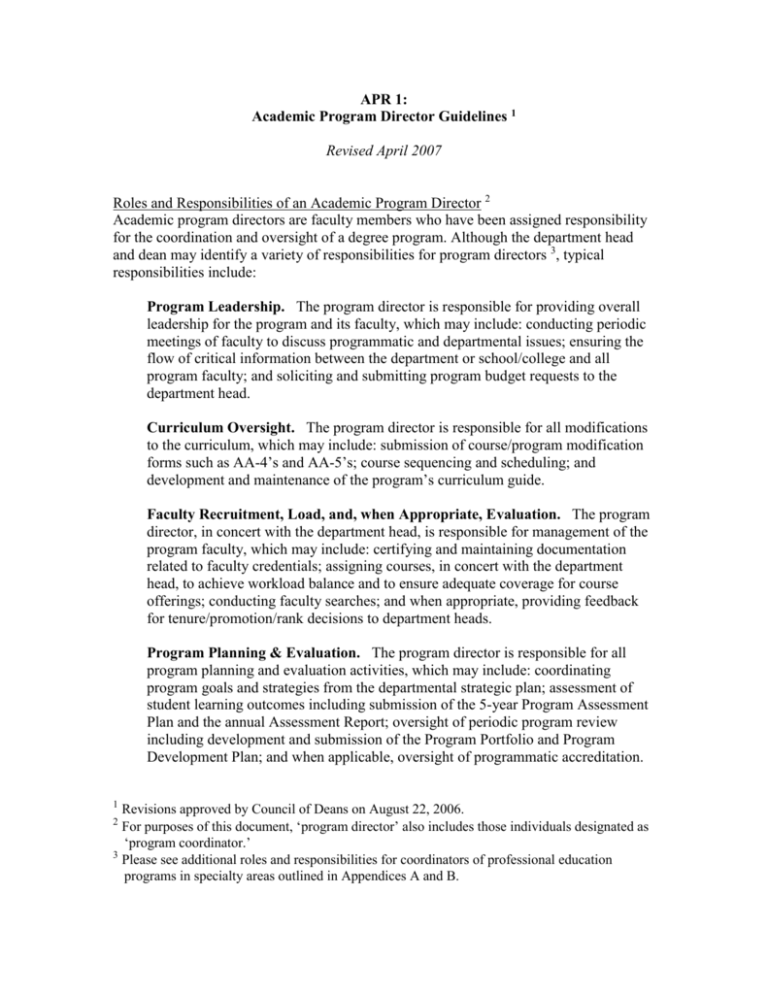
APR 1: Academic Program Director Guidelines 1 Revised April 2007 Roles and Responsibilities of an Academic Program Director 2 Academic program directors are faculty members who have been assigned responsibility for the coordination and oversight of a degree program. Although the department head and dean may identify a variety of responsibilities for program directors 3, typical responsibilities include: Program Leadership. The program director is responsible for providing overall leadership for the program and its faculty, which may include: conducting periodic meetings of faculty to discuss programmatic and departmental issues; ensuring the flow of critical information between the department or school/college and all program faculty; and soliciting and submitting program budget requests to the department head. Curriculum Oversight. The program director is responsible for all modifications to the curriculum, which may include: submission of course/program modification forms such as AA-4’s and AA-5’s; course sequencing and scheduling; and development and maintenance of the program’s curriculum guide. Faculty Recruitment, Load, and, when Appropriate, Evaluation. The program director, in concert with the department head, is responsible for management of the program faculty, which may include: certifying and maintaining documentation related to faculty credentials; assigning courses, in concert with the department head, to achieve workload balance and to ensure adequate coverage for course offerings; conducting faculty searches; and when appropriate, providing feedback for tenure/promotion/rank decisions to department heads. Program Planning & Evaluation. The program director is responsible for all program planning and evaluation activities, which may include: coordinating program goals and strategies from the departmental strategic plan; assessment of student learning outcomes including submission of the 5-year Program Assessment Plan and the annual Assessment Report; oversight of periodic program review including development and submission of the Program Portfolio and Program Development Plan; and when applicable, oversight of programmatic accreditation. 1 Revisions approved by Council of Deans on August 22, 2006. For purposes of this document, ‘program director’ also includes those individuals designated as ‘program coordinator.’ 3 Please see additional roles and responsibilities for coordinators of professional education programs in specialty areas outlined in Appendices A and B. 2 Student Recruitment and Retention. The program director is responsible for developing and maintaining materials and processes that promote recruitment and retention, which may include: creating and updating promotional brochures/literature, program website, catalog copy and degree checklist; oversight of all program-affiliated student organizations and activities such as majors’ clubs, honor societies, recognition events, etc.; and (Graduate Program Directors) recruiting graduate students and making timely decisions on admissions (by checking the electronic folders in order to make an admission’s decision about “completed” applications). Outreach. The program director is responsible for representing the academic program’s interests in both internal and external endeavors, which may include: coordinating program advisory boards; serving as a liaison between the program and other campus constituencies; and participating in community events in which the program is represented. Preferred Qualifications of Program Directors All academic Program Directors must have a terminal degree and be qualified to teach in the content area. Ideally, academic Program Directors should be senior-level faculty with rank of Associate Professor or Professor in the content area. Junior faculty with rank of Assistant Professor and full-time, non-tenure track faculty can be appointed Program Director, but these appointments should be exceptions. Prior to the appointment of a junior-level or non-tenure track faculty to position of academic Program Director, the appropriate Department Head must submit a written justification statement to the college Dean for approval. Release Time 4 for Program Directors When possible, department heads will attempt to accommodate the program director’s assignment through the service requirements of the faculty members’ load. However, when the program size and duties require additional time, the option of release time can be considered. The amount of work required for one, 3 credit course release should be equivalent to approximately ten hours per week. Program directors may be released by the department head with the approval of the dean from one class per semester, one class every other semester, or any combination of course release to accurately reflect the amount of work required for the position. 4 There are program coordinators who do not have oversight of a degree program. Any release time and compensation for these individuals should be negotiated by the department head with the dean and approved by the provost. Program Director Compensation Guidelines 3 1) Department Heads do not typically receive program director stipends unless they are also directing a distance learning program. 2) The range of stipend is typically from $600 to $3,000 depending on the size of the program and the duties required. Program directors who are 12 month employees are not eligible for program director stipends. 3) $3,000 is the maximum compensation given to any one program director regardless of resident or distant program, as well as any combination of the two 4) Stipends for distance learning program directors of certificate areas vary according to duties assigned and size of program. * Any exception to the guidelines above must be approved by the dean and the provost. Relationship to Department Head The department head supervises and evaluates the position of program director. Actions of the program director are submitted to/through the department head for action. Program Director Evaluation The department head shall consult with the departmental faculty annually to conduct an evaluation of the responsibilities of the program director. These evaluations will be incorporated into the program director’s AFE and shared with the dean. In the case of interdisciplinary programs, the supervising department head shall receive input on the program director’s performance from all department heads involved in the academic program. In addition, the release time and compensation for each program director should be reviewed annually by the department head or dean as appropriate. Term Program directors serve at the will of the department head or dean as appropriate. Program directors are expected to serve for a minimum of three years. Continuation from year to year is dependent upon successful performance evaluated by the departmental faculty through the AFE process and department head. Appendix A Coordinator of Professional Education Programs in Specialty Areas Roles and responsibilities 1. Curriculum Coordinate development of the curriculum in the specialty area so that it meets accreditation requirements: state, regional and national accreditation (SDPI, SACS, NCATE). Coordinate development of the curriculum so that candidates are knowledgeable of the NC Standard Course of Study in the specialty area. Coordinate development of the curriculum so that candidates are prepared to exceed minimum passing scores on the relevant Praxis tests in the specialty area. Coordinate development of the curriculum in the specialty area so that it complies with expectations and requirements of the professional education unit for all specialty area education programs to include: the conceptual framework, admission requirements, continuing and exit requirements (e.g., GPA, tests, required courses, clinical and field experiences, licensure, etc.), diversity technology, etc. 2. Scheduling Coordinate scheduling of required courses in the specialty area so that candidates are able to progress through the program at the expected rate and complete the program within the expired time-frame. Coordinate scheduling of required courses with other required courses in the Professional Core. Coordinate scheduling of required courses so that candidates are able to complete field and clinical experiences requirements without undue hardship. 3. Advisement Coordinate the development of accurate and current advisement materials for candidates in the specialty area to include program checklist(s), goals and objectives of the specialty area, and other information that may be needed by candidates such as requirements beyond courses (e.g., special seminars, required noncredit labs, clinical and field experiences). Coordinate advisement procedures for candidates in the specialty areas so that all candidates have an assigned advisor who is knowledgeable of program requirements including making all candidates aware of the conceptual framework, advising about field experiences, and guiding and evaluating portfolio requirements at the undergraduate and/or graduate level. Serve as the primary specialty area advisor for all alternative licensure candidates in the program. 4. Recruitment Develop contacts with the middle, secondary and postsecondary schools in the region to recruit candidates into the specialty area professional education program. Coordinate with existing recruiting efforts of the university (e.g., WCU on Tour, Open House, personal phone calls to admitted students, etc.) and other regional entities (i.e., WRESA) to promote the specialty area education program. Develop recruitment materials for the specialty area and/or cooperation with others in the development of broader materials so that the specialty area is represented. Develop a request through the Graduate School Associate Dean for needed funds for recruitment 5. Professional Education Liaison Serve as the primary liaison for professional education matters concerning the specialty area including: serving on the Professional Education Council, representing the specialty area on SUTEP committee(s), and serving on other professional education committees within the university as needed (e.g., professional education core, accreditation-related, etc.) Serve on statewide committees as appropriate (e.g., DPI, UNC-OP) to represent WCU in professional education matters generally and relating to the specialty area (e.g., reviewing the Standard Course of Study in the specialty area, review of guidelines and competencies in the specialty area, Praxis tests issues, licensure issues) Communicate with department hears(s) of specialty area and other relevant persons including dean(s), associate dean(s), department heads with courses in the Professional core, director of field experiences and specialty area faculty about status of teacher education program in specialty area and changes as appropriate. 6. Program Evaluation Serve as the primary liaison for contributions to required reports about the specialty area (e.g., IHE Performance report, Title 2 Report, Clinical and Field Experiences, SUTEP, School Services, accreditation, program review, etc.) In collaboration with other efforts on campus, periodically and systematically review the specialty area program on at least an annual basis and submit a written report to the dean of the College of Education and Allied Profession. Contribute to the development and implementation of the assessment plan for the professional education programs. 7. Instruction Teach methods courses or coordinate the teaching of methods courses in the specialty area. Supervise field and clinical experiences or coordinate the supervision of field and clinical experiences in the specialty area in conjunction with Director of Field Experiences and Dept. Head(s), as needed. Maintain current state teaching license in the specialty area. Appendix B Assessment Plan and Report Responsibilities for Professional Education Programs Shared by the College of Education and Allied Professions (CEAP) and Other Schools/Colleges The designated specialty area coordinator for each professional education program leading to a North Carolina Department of Public Instruction license is responsible for developing a Program Assessment Plan, in coordination with the CEAP program director, and for the submission of the annual Program Assessment Report to the University Director of Assessment and to the Dean of the CEAP. The department head for each designated coordinator has oversight responsibility for assessment plans and reports. The following resource persons for the development of assessment plans and reports for programs shared by the CEAP and other units include: coordinators for the BSEd, MAT and MAEd in the Department of Education Leadership and Foundations; Director of Assessment in the CEAP; Director of the CEAP Office of Field Experiences; and, Associate Dean in the CEAP. Program Assessment Plans and Reports are developed and submitted according to the format and schedule of the University Director of Assessment. Programs leading to a North Carolina Department of Public Instruction License include: UNDERGRADUATE PROGRAMS (BS) Birth-Kindergarten (Dr. Eliza Dean, edean@email.wcu.edu ) (BSEd) Elementary education (Dr. Patricia Bricker, bricker@email.wcu.edu ) (BSEd) Middle Grades Language Arts (Dr. Victoria Faircloth, victoria@email.wcu.edu ) Mathematics (Dr. Victoria Faircloth, victoria@email.wcu.edu ) Science (Dr. Victoria Faircloth, victoria@email.wcu.edu ) Social Studies (Dr. Victoria Faircloth, victoria@email.wcu.edu ) (BSEd) Secondary Education (Dr. Eddie Case, ecase@email.wcu.edu ) *(BSEd) English (Dr. Catherine Carter, ccarter@email.wcu.edu ) *(BSEd) Comprehensive Science (Dr. Patricia Hembree, phembree@email.wcu.edu ) *(BSEd) Comprehensive Social Sciences (Dr. Elizabeth McRae, mcrae@email.wcu.edu ) *(BSEd) Mathematics (Dr. Harold Williford, willifor@email.wcu.edu ) *(BSEd) Art (Dr. Erin Tapley, etapley@email.wcu.edu ) *(BSEd) Music (Prof. Michael Schallock, mschallock@email.wcu.edu ) *(BSEd) Physical Education (Dr. Dan Grube, dgrube@email.wcu.edu ) *(BSEd) German (Dr. Mark Couture, mcouture@email.wcu.edu ) *(BSEd) Spanish (Dr. Nancy Norris, norris@email.wcu.edu ) *(BSEd) Special Education, General (Dr. Karena Cooper-Duffy, kcooper@email.wcu.edu ) GRADUATE PROGRAMS (MAT) Dr. Mary Jean Herzog, CEAP Program Director, mherzog@email.wcu.edu ) (MAEd) Dr. Eleanor Hilty, CEAP Program Director (hilty@email.wcu.edu ) *(MAT, MAEd) Art Dr. Erin Tapley, etapley@email.wcu.edu ) (MAT, MAEd) Behavior Disorders (K-12) Dr. Lisa Bloom, bloom@email.wcu.edu , *(MAT, MAEd) Biology (9-12) Dr. Patricia Hembree, phembree@email.wcu.edu , (MAT, MAEd) Birth Kindergarten (B-K), Dr. Eliza Dean, edean@email.wcu.edu , *(MAT, MAEd) Chemistry (9-12) Dr. Patricia Hembree, phembree@email.wcu.edu , *(MAT, MAEd) Comprehensive Social Sciences (9-12) Dr. Elizabeth Mcrae, mcrae@email.wcu.edu , (MAEd) Elementary Education (K-6) Dr. Patricia Bricker, bricker@email.wcu.edu , *(MAT, MAEd) English (9-12) Dr. James Addison, jaddison@email.wcu.edu ) (MAT, MAEd) Learning Disabilities (K-12) Dr. Sharon Dole, dole@email.wcu.edu , *(MAT, MAEd) Mathematics (K-12), Dr. Kathy Ivey, kivey@email.wcu.edu (MAT, MAEd) Mental Disabilities (K-12) Dr. Pam Vesely, vesely@email.wcu.edu , (MAT, MAEd) Middle Grades Education (6-9) Dr. Victoria Faircloth, Victoria@email.wcu.edu *(MAT, MAEd) Music Dr. Kay Bauer, mkbauer@email.wcu.edu (MAT, MAEd) Physical Education (K-12), Dr. Justin Menickelli, menickelli@email.wcu.edu , (MAT, MAEd) Severe Disabilities (K-12) Dr. Karena Cooper-Duffy, kcooper@email.wcu.edu)_ (MS) Communication Science and Disorders [Speech language Impairments] (K-12) (Dr. Bill Ogletree, ogletree@email.wcu.edu ) (MAEd) Reading (K-12) Dr. Barbara Bell, bbell@email.wcu.edu , (MAEd) School Counseling Dr. Lisen Roberts, lroberts@email.wcu.edu , (MA) School Psychology Dr. Candace Boan, cboan@email.wcu.edu , *(MAT, MAEd) Social Sciences (9-12) Dr. Elizabeth McRae, mcrae@email.wcu.edu (MAEd) Instructional Technology Specialist Dr. Robert Houghton, houghton@email.wcu.edu , (MAEd) Curriculum Instruction Specialist Dr. Casey Hurley, hurley@email.wcu.edu ) (MAEd) Community College Administration Dr. Mitch Williams, mwilliams@email.wcu.edu MAEd) Community College Teaching Dr. Ann Alexander, aalexander@email.wcu.edu (MSA, EdS) School Administrator MSA: (Dr. Kathleen Jorissen, kjorrisen@email.wcu.edu ) Ed.S. (to be appointed) (Ed.D.) (K-12 School Administration, Dr. Sandy Tonnsen, Tonnsen@email.wcu.edu ; Curriculum and Instruction, Dr. Gayle Moller, moller@email.wcu.edu ; Community College, Dr. Kevin Pennington, kpennington@email.wcu ) * shared program
